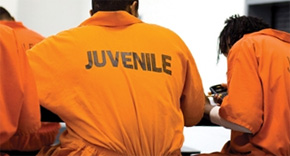State Examines Services For Foster Kids In Trouble With The Law
May 5, 2016
Thousands of youths in Florida’s child-welfare system have gotten in trouble with the law — and when they do, their caregivers often refuse to take them back.
Now policymakers are trying to improve services to the teens, saying those children had already been abused or neglected when they began acting out in foster care. A work group of the Florida Children and Youth Cabinet has been developing policy recommendations for so-called “crossover youth,” and a meeting on the subject is expected to take place in June.
 The policymakers say these young people are among the most challenging in any state system — and the most at risk to spend their lives behind bars or on public assistance.
The policymakers say these young people are among the most challenging in any state system — and the most at risk to spend their lives behind bars or on public assistance.
“We’ve got to get past the rhetoric and sit down and figure out what’s best for these youths, because if we don’t get it right, they’re going to be in our adult prison system when they’re 20 years old,” said Mark Jones, chief executive officer of the Community Partnership for Children, the private agency in charge of placing foster children in Volusia, Flagler and Putnam counties.
According to the Florida Department of Juvenile Justice, 3.4 percent of the 42,211 youths arrested during fiscal year 2014-15 were living with foster families, other caregivers or in group homes at the time of their offense. That’s 1,428 kids, who averaged 2.4 arrests apiece over 12 months.
“The population isn’t great (in size),” DJJ Secretary Christy Daly said. “It’s just that this population is very, very high-need — and very challenging.”
Many caregivers simply can’t cope with troubled teens after a certain point, said Christina Spudeas, executive director of the advocacy group Florida’s Children First.
“I’ve seen them tell the judge, ‘I’ve got six other kids. I can’t keep missing work. I’m going to lose my job, I’m going to lose my home — because of him,’ ” Spudeas said. “Then they call (the Department of Children and Families).”
Fed-up foster parents may refuse to care for the youth any longer. Sometimes the caregiver is willing to retrieve the youth following an arrest, but the judge has imposed a no-contact order due to the youth’s previous battery of the caregiver.
These teens are known as “lockouts.” A second category of crossover youth has no caregiver available due to a death, hospitalization or incarceration.
According to the Department of Children and Families, 14 of Florida’s 17 community-based care lead agencies — which handle foster-care placements — spent $7.7 million on services for 610 crossover kids between July 2014 and March 2015. Of the youth who were identified, 326 were lockouts and 284 had no caregiver available.
What’s more, advocates say, teens who have been arrested face harsher penalties without an adult to support them in court.
“The data shows that children who are accompanied by a parent or caring adult get a lesser sentence and the least-restrictive consequences,” Spudeas said.
Child-welfare professionals say that the kids are challenging because they’ve been traumatized. But it’s unclear how the state can improve its services to them, given the complexities of a system that crosses state agencies — and not just DCF and DJJ.
“The root of the issue for a lot of these kids is behavioral health,” DCF Secretary Mike Carroll said. “A lot of times, we’re not dealing with these kids until they have to come into residential care. … We need to be doing more upstream, so these kids and these families don’t get to that point.”
That means early identification and the coordination of services at the local level. Jones said it could also mean an enhanced placement, such as a specially-trained foster family or a houseparent-style group home with specialized intervention services.
State Rep. Gayle Harrell, the Stuart Republican who chairs the House Children, Families and Seniors Subcommittee, said placement is crucial in such situations.
“Going back into the foster-care system is very problematic because you can’t find a foster family that’s capable of handling them or will handle them,” Harrell said. “And most of them wind up in group homes. And you need to make sure that you have the right type of group home for them.”
What’s more, said Florida Children and Youth Cabinet Chairwoman Wansley Walters, the funding for such services isn’t always available.
“One of the main impediments, when you have kids going between systems, is that it starts breaking down on who pays for what,” said Walters, a former DJJ secretary. “We need the money to follow the child. But we’re not structured to have the money follow the child. And it gets very complex when you’ve got a kid being served in both systems.”
by Margie Menzel, The News Service of Florida
Comments
2 Responses to “State Examines Services For Foster Kids In Trouble With The Law”



How bout stop taking children from they’re parents over allegations, opinions and hearsay..
I was a foster child from the time i was 7 till…it sucked & yes I got in trouble..these kids need mental help from day 1 to make it in life…seriously